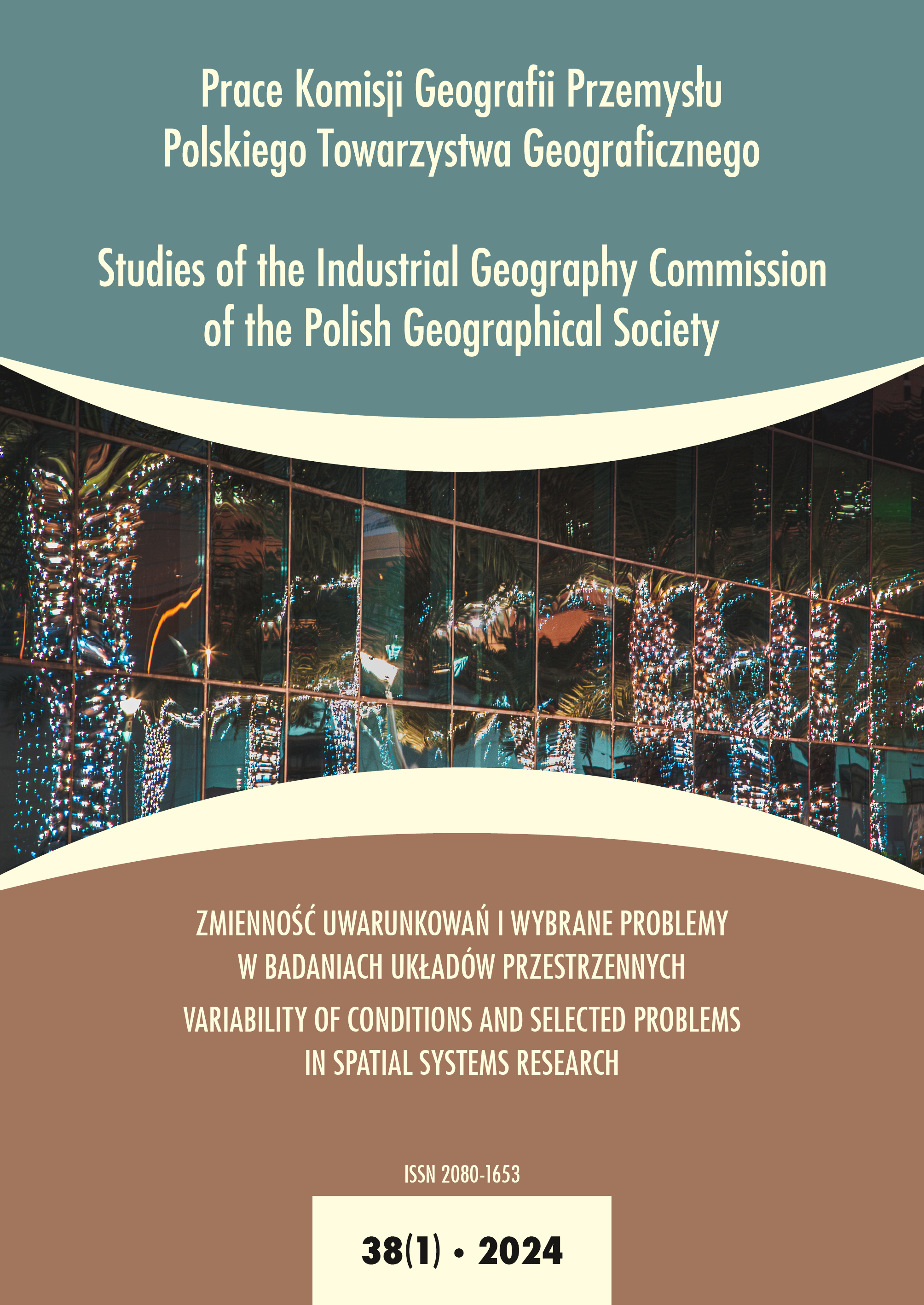Contemporary conditions for the development of chain hotels in Poland – introduction to the functioning of large tourist enterprises
DOI:
https://doi.org/10.24917/20801653.381.2Abstract
Hospitality belongs to one of the world’s oldest and continuously functioning service sectors, the origin of which dates back to antiquity and the early Middle Ages. Like entities in other sectors, hospitality companies can function and often operate independently or within networks that trigger synergistic effects. The publication aims to present the current situation and forecasts for chain hospitality in Poland in the context of, among others, the military conflict in Ukraine and the post-pandemic period. Foreign and domestic hotel chains and operators active in the Polish tourism market were considered for the publication. The research hypothesis is as follows: In Poland, chain hospitality constantly develops despite unfavourable external factors affecting the domestic and incoming tourist traffic volume. These factors include the effects of the pandemic, economic recession, inflation and a significant influx of immigrants in connection with the war in Ukraine. The research methods include analysing the existing data and literary criticism. The article uses compact materials, statistical data and netography. The research results positively verify the thesis. The motives for choosing the publication theme were the author’s academic interests and the lack of literature in this area
Downloads
Metrics
References
Andrzejczyk, R. (2022). Ekspansja międzynarodowych sieci hotelarskich w Polsce. Zarys głównych trendów (1989–2018). W: P. Grata (red.), Modernizacja gospodarki dawnej transformacji us- trojowej, Rzeszów: Wydawnictwo Uniwersytetu Rzeszowskiego.
Danilewicz, D. (2020). Wyzwania zarządzania w branży hotelarskiej w obliczu zmian społecznych i technologicznych. W: M. Urbaniak, A. Tomaszewski (red.), Wyzwania społeczne i techno- logiczne a nowe trendy w zarządzaniu współczesnymi organizacjami. Warszawa: Oficyna Wydawnicza SGH.
Dominik, P. (2015). Zarządzanie hotelem. Wybrane zagadnienia. Warszawa: Difin.
Firlej, K., Spychalska, B. (2015). Wybrane uwarunkowania branży hotelarskiej w Polsce. Roczniki Ekonomiczne Kujawsko‑Pomorskiej Szkoły Wyższej w Bydgoszczy, 8, 202–221.
Gheribi, S.E., Bonadonna, A. (2019). The International Hotels Groups on the Polish Market – Competition Strategies of Selected Examples. Quality – Access to Success, 20(171), 49–55.
Ivanova, M., Ivanov, S. (2015). The naure of hotels chains: An integrative framework. International Journal of Hospitality & Tourism Administration, 16(2), 122–142.
Jokelainena, J., Garrod, B., Sthapit, E., Pesonen, J. (2023). The role of experiential familiarity in shaping hotel – chains conpetetiveness. International Journal of Contemporary Hospitality Management, December.
Kociszewski, P., Sala, K. (2022). Funkcjonowanie sieci hotelowej Arche – koncept kolekcji hoteli w przestrzeniach historycznych. W: J. Żylińska, J. Telep (red.), Współczesne wyzwania zarządzania, bezpieczeństwa i nowoczesnej inżynierii. Warszawa: Uczelnia Techniczno-Handlowa im. Heleny Chodkowskiej.
Milewska, M., Włodarczyk, B. (2018). Hotelarstwo. Organizacja i funkcjonowanie obiektów nocle- gowych. Warszawa: PWE.
Największe sieci i marki hotelarskie na świecie. (2023, 20 lipca). Pozyskano z: https://www.e-hotelarz.pl/artykul/45513/najwieksze-sieci-i-marki-hotelarskie-na-swiecie/ (dostęp: 10.11.2023).
Napierała, T. (2013). Charakterystyka rozmieszczenia hoteli sieciowych w Polsce. W: K. Borówka, A. Cedro, I. Kavetskyy (red.), Współczesne problemy badań geograficznych.. Szczecin: Uniwersytet Szczeciński, Wydział Nauk o Ziemi, 187–196.
Obszary tematyczne. Kultura. Turystyka. Sport. Turystyka. (2023, 10 grudnia). Pozyskano z: https://stat.gov.pl/obszary-tematyczne/kultura-turystyka-sport/turystyka/ (dostęp: 10.12.2023).
Panasiuk, A. (2021). Ekonomika turystyki i rekreacji. Warszawa: PWN.
Panasiuk, A., Szostak, D. (2008). Hotelarstwo. Usługi – Eksploatacja – Zarządzanie. Warszawa: PWN.
Popsa, R. (2021). Conceptualizing business models of international hotel chains. Revista Economica, 73, 2, 89–97.
Puciato, D. (2016). Przedsiębiorstwo hotelowe. Aspekty ekonomiczne, finansowe i organizacyjne. Warszawa: Difin.
Raport z Rynku Hotelarskiego i Gastronomicznego 2023. (2023, 10 lipca). Pozyskano z: https://www.e-hotelarz.pl/artykul/92376/raport-z-rynku-hotelarskiego-i-gastronomicznego-2023-pelna-wersja-online/ (dostęp: 10.11.2023).
Richard, B. (2017). Hotel chains: Survival strategies for a dynamic future. Journal of Tourism Futures, 3(1), 56–65.
Rynek Hotelarski w Polsce – RAPORT 2023. (2023, 12 października). Pozyskano z: https://www.horecanet.pl/rynek-hotelarski-w-polsce-raport-2023-dostepny/ (dostęp: 10.11.2023).
Sala, J. (2019). Hotelarstwo. Usługi, Zarzadzanie, Procesy koncentracji. Warszawa: PWE.
Sala, K. (2019). Praktyczne wykorzystanie obiektów poprzemysłowych w Polsce na przykładzie hotelarstwa hard loftowego. W: Z. Zioło, J. Piontek (red.), Problematyka 35. Jubileuszowej Międzynarodowej Konferencji Naukowej nt. „Funkcje przemysłu i usług w rozwoju społeczno‑ekonomicznym układów przestrzennych”. Kraków: Wydawnictwo Uniwersytetu Pedagogicznego.
Sala, K. (2021). Hotelarstwo unikatowe. Uwarunkowania rozwoju. Kraków: Wydawnictwo Naukowe Uniwersytetu Pedagogicznego.
Sala, K. (2023). Współczesne trendy w hotelarstwie sieciowym – studium przypadku Polski. W: K. Huczek, M. Ścigała, J. Żylińska, K. Gawkowski, P. Przybylski (red.), Współczesne proble- my prawa, zarządzania, bezpieczeństwa i nowoczesnej inżynierii. Warszawa: Wydawnictwo Uczelni Techniczno-Handlowej im. Heleny Chodkowskiej.
Sidorkiewicz, M., Pawlicz, A. (2015). Propedeutyka hotelarstwa. Ujęcie ekonomiczne. Warszawa: Difin.
Szostak, D. (2004). Podstawy hotelarstwa. Materiały do ćwiczeń i wykładów. Szczecin: WNUS.
Szykina, O. (2018). The dynamics of the international hotel industry development on the example of hotel chains. Actual Problems of the Economics, 12(210).
Tapiki, S. (2013). Evaluating economic viability of the lodging industry. Independent vs chain ho- tel. International Conference „Contemporary Trends in Tourism and Hospitality”, September 2013, 287–297. Pozyskano z: https://ssrn.com/abstract=2332716 (dostęp: 10.11.2023).
The world’s top 10 hotel groups in 2023. (2023, 30 czerwca). Pozyskano z: https://www.bowo.fr/en/blog/the-worlds-top-10-hotel-groups-in-2020 (dostęp: 10.11.2023).
Tulibacki, T. (2000). Międzynarodowe systemy hotelowe w Polsce. Warszawa: WSHGiT. Turkowski, M. (2010). Marketing usług hotelarskich. Warszawa: PWE.
Downloads
Published
How to Cite
Issue
Section
License
Copyright (c) 2024 Studies of the Industrial Geography Commission of the Polish Geographical Society

This work is licensed under a Creative Commons Attribution-NoDerivatives 4.0 International License.
Articles are published under the terms of the Creative Commons License (CC BY-ND 4.0; Attribution– NoDerivs).

